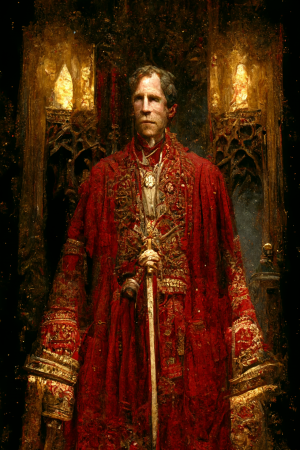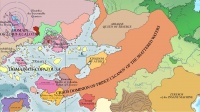Prince Ulcanov of the Shattered Waters
![]() born 2087 (disputed), slain 2278, ruled 2119 to 2278. Truly the most infamous Chaos Ruler of the Middle Ages, Prince Ulcanov exercised a natural gift for chaos magic with an instinctual insight into spellcasting. Capricious, cruel, and darkly imaginative, Ulcanov became King of Aurice, lord of Lucacia, and Overlord of Corundy and Erserce, ruling out of his bale palace, the Gourd of Summons, that according to legend fed on the blood of children, crawling over land and sea. He insisted upon many styles, most notably, "Tyrant of Irresistible Chaos, Duke Chaotic of Fair Corundy, King of Aurice[1], Nephew of Chaos Immanent, Lord of the Nine and Ninety Knells."[2] In history and literature, Prince Ulcanov is often called the 'Dark Prince' because of his foul acts of inhumanity and his dark and somber temperament.
born 2087 (disputed), slain 2278, ruled 2119 to 2278. Truly the most infamous Chaos Ruler of the Middle Ages, Prince Ulcanov exercised a natural gift for chaos magic with an instinctual insight into spellcasting. Capricious, cruel, and darkly imaginative, Ulcanov became King of Aurice, lord of Lucacia, and Overlord of Corundy and Erserce, ruling out of his bale palace, the Gourd of Summons, that according to legend fed on the blood of children, crawling over land and sea. He insisted upon many styles, most notably, "Tyrant of Irresistible Chaos, Duke Chaotic of Fair Corundy, King of Aurice[1], Nephew of Chaos Immanent, Lord of the Nine and Ninety Knells."[2] In history and literature, Prince Ulcanov is often called the 'Dark Prince' because of his foul acts of inhumanity and his dark and somber temperament.
Birth and Early Life
The year of Prince Ulcanov's birth is dated to 2087 based upon accounts preserved from the Codex Noctium, the court history which the Dark Prince ordered to be kept. This date is deemed spurious by many scholars, but in the absence of any alternative evidence has been traditionally accepted by historians. It is well-accepted that powerful magics can extend human life and Ulcanov's suggested life of nearly two hundred years is possible. Ulcanov's early life is scarcely known. Scholars believe that Ulcanov was born in Lucacia and probably in Aurice or at least Goscundy, that he was of lesser noble birth and well educated in natural philosophy, history, mathematics, and religion. Scholars do not agree on his likely birth religion but concur that if the Dark Prince converted to the worship of Chaos Cults, he did so early on in his career. Scholarship of the early to mid twenty seventh century (ca 2610 to 2640) has endeavored to show that Ulcanov's worship of the Chaos Gods was apotropaic, that is designed to avert their anger and destructive forces rather than out of any real piety. His true power lay in his masterful wielding of the Scarab-of-Night-Turned-Day.
Scarab-of-Night-Turned-Day
At some point in his life, Prince Ulcanov acquired the Scarab-of-Night-Turned-Day. The earliest date we can be sure of is 2117 when at least two different accounts report that he used the Scarab to slay contending Chaos Priests in magical combat. The Scarab itself was thought fanciful up to that time and would likely have remained an obscure legend had Ulcanov not brought it to light. The Scarab's own origin is much contested and merits it own account.
Personal Symbol
Prince Ulcanov employed the symbol of a blood-red full sun, dripping blood, with the image of the Scarab-of-Night-Turned-Day imposed over it. It was often used on vexilla for the prince's throe army.
Transformation of the Knights-Magi of Aurice
Wielding the legendary Scarab-of-Night-Turned-Day, Ulcanov destroyed the Knights-Magi of Aurice and the noble warriors who revolted against his evil reign and forced the survivors to give birth to throe-children through the navel, to form a new army to serve him. This obscenity, causing one gender unnaturally and with excruciating pain to perform the behavior of the other fouled Ulcanov's hateful memory through the ages. A large minority of the Knights-Magi of Aurice who served elsewhere went into a permanent exile for over a century during which they never directly contested the Dark Prince until the Fifth Isbajath which brought about the end of his regime.
Throe Army
The throe children of the transformed warriors and knights became the core of Ulcanov's unnatural army. He fortified his army on several occasions by transforming uhlaks and other warriors into birthing creatures for more throe minions. He intentionally allowed some of the birthing creatures to escape so that others would learn of the fate of those who opposed him. One uhlak leader was so enraged that he marched immediately to the shores of Aurice. He and his warriors suffered the same fate. For Ulcanov, whether they fought him or fled from him, was equally useful.
Bizarre Self-Preservation
Ulcanov through his wicked concourse with the gods of Chaos, placed his various bodily members and organs in different containers when he slept through the night, his soul voyaging through alien realms beyond our own. In the morning at the conclusion of his travels, the boxes would open and his members reassembled into his corporeal form. Each box holding an organ or member was thoroughly enchanted to prevent tampering or removal by any would-be assassin or usurper. Several efforts brought about the gruesome deaths of the attempters. The heart box, for example, was guarded by a rare female Aio who sang in multiple registers of consciousness and drove the listener permanently mad. The kidneys were kept plugged up in tall vases made of highly enchanted glass that glimmered all manner of opalescence in the shapes of alien reptile creatures, shaped like lizards with bug-like antennae. According to legend, the aging housemaid, Samyrna the Wake-Maid, would bring out the vessels in the morning and ring a bell to summon Ulcanov's soul back into his body.
Construction of Colossus to God Lygdamion
Prince Ulcanov enslaved throes, magical beasts of chaos, to construct a great statue rising out of the sea south of Aurice to commemorate the Anarchs, the most powerful gods of Chaos. It is generally accepted that the image is of the Chaos God Lygdamion whom Ulcanov worshiped. The monument reached nearly 57m (187 feet) high. Years after Ulcanov's rule, the colossus was reshaped into the likeness of the Isxinthion god, Amrulon, since it was impractical to have it destroyed.
Wars against the Uhlaks
Ulcanov's summoned army of throes and human minions warred continuously against the uhlak tribes of the Shakhumbla to the east. These conflicts were associated with the Anarch Wars when the Witchlands or Throe Wastes arose east of Lucacia through the use of baneful chaos magic invoked by the presence of powerful chaos practitioners and the Communions, gods of chaos, who manifested in person during the combats.
Epithet "Of the Shattered Waters"
He is called "of the Shattered Waters" for his peculiar use of the Scarab-of-Night-Turned-Day to affect the waters in which the city of Aurice rests. His powerful magics caused the waters to behave completely alien to natural water, generating holes, cracks, and fissures in the sea. Thus the waters were said to be shattered.
Gourd of Summons
The Gourd of Summons, as Prince Ulcanov called it, was the beetling, monstrous palace in which he resided. Legend says that the palace devoured some of the islands of Aurice and created new rivens, although this is now considered apocryphal by most scholars. The Gourd of Summons moved slowly but steadily and could cover both land and water and on some occasions flew under Prince Ulcanov's influence. The gourd's architecture was alien, beautiful, and thoroughly enchanted. The shimmering surfaces of the palace bore the likenesses of the victims and favorites of Prince Ulcanov, animate and posing, as if trapped in glass. Sometime before the Prince's demise, he dispensed with the Gourd of Summons for reasons that are not explained in the ancient sources.
Treatment of Juffa Pretenders
During the reign of Prince Ulcanov of the Shattered Waters, there were many who presented themselves to the Prince as Juffas, including Umajosso of Vilangril and Dida the Ecstatic. The Prince both rejected and slew them and every other would-be Juffa until no such candidates visited his court any longer. In turn, the Prince sought out potential Juffas and slew them. This is one reason that some believe Airdred the Wily avoided the court of Ulcanov, though in fact Airdred never made any pretense to the role of Juffa. Some say that Prince Ulcanov was an unsuccessful Juffa and thus detested those who would achieve what he failed to accomplish.
Prince Ulcanov's Leadership and Warfare in the Fifth Isbajath

The Dark Prince powerfully used the Scarab-of-Night-Turned-Day to defend Aurice from the invading tis'bajuma and drove them off for well over two years. He fought directly with the lead tis'bajuma who sought to slay him. In the Battle of the Dark Prince (2278), Rhiomel 6, Ulcanov slew Amnwbis of Medibgö and fought directly with Gidhoniel kab S'ephah and others. Gidhoniel kab S'ephah slew the Dark Prince.
Demise
Prince Ulcanov was slain in the Fifth Isbajath, 2278 AI, by Saint Gidhoniel kab S'ephah, a powerful Shaphrizite warrior and older brother to then Incarnandina, Eseleth kath Besheth. Gidhoniel slew Prince Ulcanov by means of the Sword Wanewake in personal combat. According to legend, Gidhoniel said calmly, 'I release you,' when he plunged the sword Wanewake into Ulcanov's heart.[3]
List of Vassals
The following lesser rulers were vassals of Prince Ulcanov. This list is incomplete.
- Ariagse Queen of Erserce
- Ephresoult the Dreadful, ruler of Goscundy, slain by Ulcanov in 2221
- Glittering Nesilivo Spawn of Amonthrace
- Ozruhul Demonfriend
- Jijath Lord of the Slithering Vine
- Zantvika Queen of Johaulia
- Nintheptissa Lady of Zamiria
Servants
- Lord Khavost Olima
Lord Khavost Olima was a loyal servant to Ulcanov whose more famous daughter, Saint Olmima Olima, converted to Incarnandism and founded a monastic order. Amnwbis of Medibgö slew Khavost Olima in combat.
- Samyrna the Wake-Maid
Samyrna was the aging housemaid entrusted with the service of the vessels that held Ulcanov's bodily organs when he slept.
- Boy Tamber
The legends of Boy Tamber have made him possibly the most well known of Ulcanov's servants.
List of Servants of Prince Ulcanov
Legacy
In Lucacia, Prince Ulcanov is often called the Dark Prince. His wickedness has made the office of the King of Aurice despised by many Lucacians. The Anarch Wars, 2266 to 2324, are thought by some scholars to have been the consequence of the vacuum created by the slaying of Prince Ulcanov (died 2278) who ruled over a realm greater than any other chaos ruler of the Middle Ages.
Depictions in Music and Literature
The infamy of Prince Ulcanov's reign and his defeat at the hands of Incarnandist heroes have inspired numerous works of poetry, song, and opera.
Bath-Times of Lord Ulcanov
The Bath Times of Lord Ulcanov, written in the twenty seventh century, is an Aurician opera by Enrayom the Cantiran, composer, and Tmaru Vazancha, librettist, that premiered in Aurice in 2649. Set in the palace of Lord Ulcanov, the opera introduced a modern audience to lavish depiction of the legendary Chaos Ruler of Aurice.
Boy Tamber
Now told as a frightening child's tale, the account of the Boy Tamber is thought to carry many grains of historicity. The story speaks of one boy, Tamber, who was acquired as a servant or slave by Prince Ulcanov. The Dark Prince sent the boy on small errands that eventually became great errands. In one errand, the boy hears an Incarnandist wretch curse Prince Ulcanov that doom would claim the Prince when the boy could no longer fulfill his errands. Eventually, the last errand was to bring Prince Ulcanov the heart of a man more wicked than himself. The boy uses cleverness and intrigue to postpone the fulfilment of the errand by which time Saint Gidhoniel slays the Dark Prince and liberates boy Tamber. Traditionally, the story was told over a series of nights in the winter with one errand told per night, until the last night accomplishes the death of Prince Ulcanov.
Chronology of the Life of Prince Ulcanov
- 2087: Birth of Ulcanov (Disputed)
- 2119 to 2278: reign of Prince Ulcanov
- 2246, Zantvika Queen of Johaulia becomes vassal of Prince Ulcanov
- Siege of Aurice (2275 to 2278)
- Battle of the Dark Prince (2278), 2278 Rhiomel 6
List of Persons Slain or Reputed to have been Slain by Prince Ulcanov (Incomplete)
- Amnwbis of Medibgö, slain in the Battle of the Dark Prince (2276)
- Captain Shumzab, a tis'baja of the Fifth Isbajath
- Dida the Ecstatic (Pretender Juffa)
- Grespo Tabroçetto, leader of the Knights-Magi of Aurice
- Saint Iphimba, a young Incarnandist woman
- Saint Zarzudio
- Umajosso of Vilangril (Pretender Juffa)
Notes
Sources
 Primary Sources
Primary Sources
- Codex Noctium, 22nd to 23rd century, disputed
- Espruga Letters
- Glamsagin Chronicle, ca 2290, history, Ra'esel kab Naphug, relates Fifth Isbajath and related historical events
- Guth Perncha Treasure, Galdimesan Archguild Museum of Aurice
- Magianic Scarab, Galdimesan Archguild Museum of Aurice
- Royal Charges of Lord Ulcanov, ca 2290, state document
- Teltagurn Fresco, ca 2250, City of Aurice
 Secondary Sources
Secondary Sources
- Combat of Airdred, Late 2300's, Alabast ennekhá Gaskondain Balacha
- Five Lives of the Princes of Chaos, 2579, Amric Ethuve
- God's Whirlwind: The Isbajutha, 2568, Thulinantis Tepriax of Zamaclë
- Legend of Saint Gidhoniel, ca 2400's, Gasraf kab Eth'eb
- Obscenities of Chaos Cults in Pre-Isbajath Aurice, 2603, Drey Tvanko
See Also
- Anarch Wars, 2266 to 2324
- Chaos Magic
- Fifth Isbajath
- List of Greater Chaos Rulers of the Middle Ages
- Middle Ages of Chaos
- Gidhoniel kab S'ephah
- Gourd of Summons
- Ulcanovite Period
| This article is a stub. It requires further development by the creator. |

